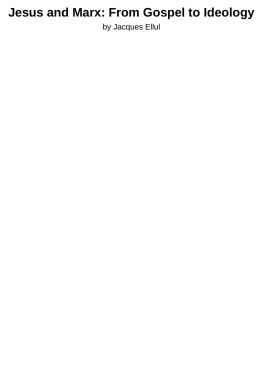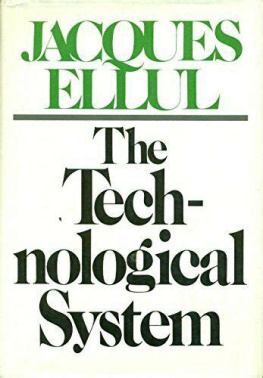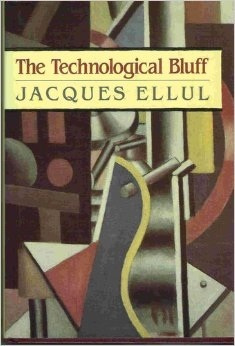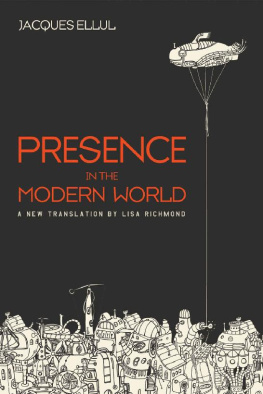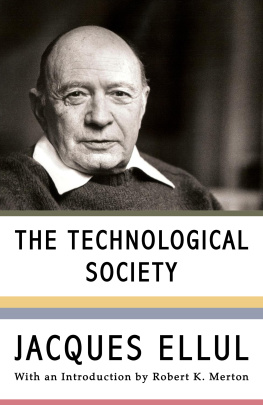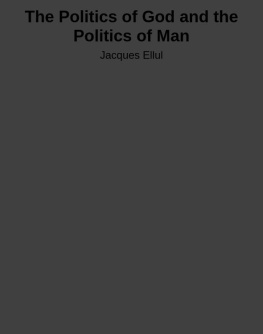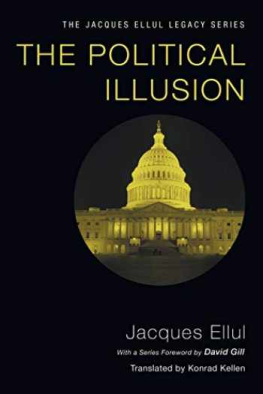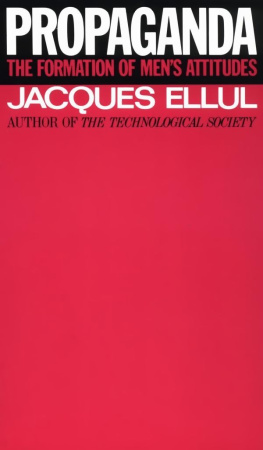Jesus and Marx: From Gospel to Ideology
by Jacques Ellul
I: Introduction
Christianity and Ideologies
"Ideology" has become a hackneyed topic for discussion, but it can mean just about anything. In common usage, it means "any opinion different from mine," always with an unfavorable connotation. If we look to specialists, we discover as many definitions as there are sociologists!
Let us begin with my definition, a kind of common denominator often used in specialized studies. This one has the advantage of relating concretely to the facts: an ideology is the popularized sentimental degeneration of a political doctrine or worldview; it involves a mixture of passions and rather incoherent intellectual elements, always related to present realities.
Today's political universe is littered with ideologies that make the practice of politics both easier and more difficult. They make it easier to manipulate the masses through propaganda, but they complicate decision making, since the ideological effect must always be taken into account. Anything can be labeled an ideology, just as anything can become one: Nationalism, Socialism, Liberalism, Democracy, Marxism, Anti-Racism, Feminism, etc. Often an ideology springs up to parry an ideology-free practice. Male domination for example, has no explicitly formulated ideology; feminist ideology arises to oppose it. Capitalism is a practice with no explicitly formulated ideology; socialist ideology arises to oppose it. Afterward, capitalism will produce an ideology of "defense. Often an ideology strives with an outdated ideology: racism is still practiced but no longer has a genuinely ideological expression. But opposite it anti-racism comes to life-and it is thoroughly ideological.
Within this expanding ideological movement so peculiar to our time, Christianity can clearly also become an ideology. In fact, it has become one. As faith, as God's revelation in Jesus Christ, as theology (searching to make faith and revelation explicit), as a practice that is faithful to God's will, Christianity is not an ideology. But it has become one, and relentlessly continues to become one, whenever it is a means for distinguishing those who are right from those who are wrong (the saved and the damned), a principle for life conduct and for directing the world, a Christian political construct, a will to convert at any cost in order to swell the ranks of a given church, a system for organizing society, or a moralistic system (teaching that behavior is objectively good or bad, according to a clear and timeless definition of good and evil). In any of these cases, Christianity is truly an ideology.
Each of these errors involves a degeneration: of theological doctrine into simplification, of faith into beliefs and feelings, and of the practice of freedom into mere religion. The blending of these three errors produces an ideology. This is a serious matter! Christianity was originally an anti-ideology! The very concept of revelation opposes ideology and Christianity (an "ism" [in French]-but it should not be!).
Two timeless principles oppose ideology and Christianity: (1) God's biblical revelation necessarily entails iconoclasm, that is, the destruction of all religions, beliefs, idolatrous images, and fads. We must bring this up to date and apply it to our current idols-Money, the State, Science, etc.-but also to religions like Communism and Maoism. Iconoclasm aims at everything ideological that tends to take the place of the revealed God. (2) On the practical level, the Bible reveals that all Christian conduct is founded on God's liberation. God does away with our alienation so that we can live as free people. Thus we must attack all ideologies, since they force us to conform, join us to an orthodox group, and sweep away our capacity for choice and individual reflection.
The agonizing difficulty in all this involves detecting ideology. If the Christian faith prepares us to ascertain ideology, where do we find it? Clearly the first step is to question Christian ideology itself: Christianity as power and as ideology. In this connection we see that Karl Marx's and Friedrich Nietzsche's criticisms, for example, are clearly on target. They question the ideological aspect of Christianity.
But it would be much better for Christians themselves to do this work. All we must do is get on with criticizing our own ideas, convictions, churches, and movements on the basis of a demanding rather than a rationalizing reading of the Bible. This means; we must renounce reading the Bible to find arguments to justify our behavior or that of our group. Any time we read the Bible to find arguments or justifications, we wallow in Christian ideology.
If I read the Bible in order to listen to the questions God asks me about my thoughts, my behavior, my church, then I am well on the way to destroying ideology. This is because the first step toward criticizing ideologies as a group is to question Christian ideology On that basis we can develop the possibility of an overall and radical challenge, which involves nonconformity to the world. The second step is understanding and applying Paul's teaching: "Do not be conformed to this world but be transformed by the renewal of your mind" (Rom. 12:2). This is typical of anti-ideological action. It involves discerning the sociological trends in our society. Precisely because they are sociological, they tempt us to join in with everyone else and, of course, to justify our actions ideologically. This rationalization appears to be a new understanding of the world, a belief in Progress, the Good, justice, or Truth.
The touchstone in this case is to detect the sociological nature of the trend. "A given way of doing things appealed to no one twenty years ago; I would not have thought twice about it. Now it becomes fascinating, and I find it attractive. Why am I attracted? Because this thing is true, just, or good? No, since in that case I would have been interested twenty years ago. I find it tempting because the media give it attention and because so many millions follow and believe it."
Nudist behavior, for example, was not really "forbidden or suppressed" half a century ago; it simply did not exist, and nobody thought about it or felt a need for it. Today thousands of people find they have a frantic need to practice nudism. They feel scandalized when nudity is "suppressed," and consider nudism a conquest for freedom. But, of course, nudism exists as a need only because hundreds of thousands of people practice it and because we are given a rationalizing ideology of nudism. This means that there is no conquest for freedom involved, just obedience to a sociological trend. This is only one example.
Thus we detect purely ideological talk as the product of a trend involving many people who justify their behavior by such talk. Their behavior expresses only a major societal tendency. In other words, conforming to the "world" is evil compared with freedom in Christ, and we must fight such conformity's translation into ideology. I must detect how each ideology expresses conformity to society and attracts me. This process is doubly important since ideology involves me inevitably in false problems without importance.
We can look at this falsity in two ways. (1) As we have said, ideology is the degeneration of a doctrine. Such a doctrine was generally conceived as related to the reality its author lived in and the problems posed by that reality. But when, after a time, this doctrine was slowly popularized, made commonplace, and mixed with beliefs and passions, it ceased to refer to a genuine reality. Reality was left behind. For example, Marx's thought was worked out in relation to the problems of his time, with which he was admirably well acquainted. He offered precise solutions for these problems. But a century later, Marxist ideology continues to repeat a whole batch of formulas that no longer have any connection with the real problems of our time.
Next page
